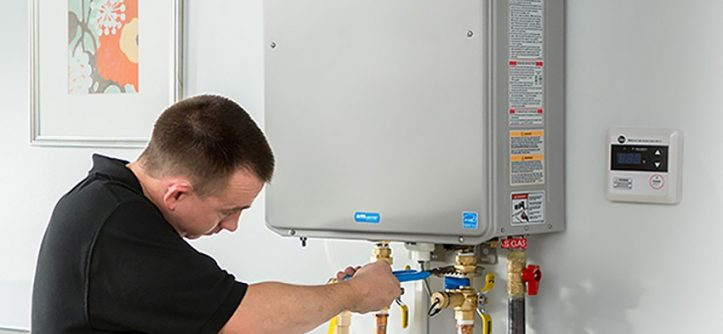Water heaters don’t last forever. Property owners need to monitor this appliance to ensure it continues to work properly and take prompt action when any problems arise. Water does a great deal of damage in the home in a short period, so this is one appliance it’s always best to replace before a new unit becomes necessary.
Property owners find they now have a choice between traditional water heaters with storage tanks and tankless water heater units. What are the tankless water heater pros and cons the consumer should know before making a purchase? This information is of great importance in ensuring you make the right choice.

THE BENEFITS
In the eyes of many, tankless water heaters seem like the greatest thing since sliced bread. There are many benefits associated with this appliance consumers must know before buying. The following are only a few of these benefits, and purchasers discover numerous more once they begin using the unit regularly.
Continuous Hot Water
Very few people enjoy taking a cold shower in the morning. When several family members shower simultaneously or one right after the other, having enough hot water for all isn’t possible. A storage tank doesn’t hold that much water, but this problem is eliminated when using a tankless unit. This system heats the water as needed, so the supply never runs out. The only time hot water becomes an issue is when the energy source powering the unit and heating the water isn’t operating. In fact, many multifamily properties have switched to tankless water heaters to meet the needs of residents at all times.
Lifespan
Tankless water heater manufacturers use durable materials and rugged construction to ensure these devices hold up with regular use. As a result, property owners know the money they are spending will get an appliance that lasts for years to come. Most models include replaceable parts, which helps to save money because the unit won’t need replacement if something goes wrong. This benefits the owner and the environment. Many consider the environmental impact of an appliance before making a purchase, so this information becomes very helpful.
Minimal Footprint
Space continues to be at a premium in many homes, and homeowners wish to maximize every inch available to them. Making the switch to a tankless water heater helps to achieve this goal because these devices don’t include the oversized tank. A 40- or 60-gallon storage tank takes up approximately two feet of floor space, and that’s only in terms of the width. It also rises up to five feet in the air. The tankless heater hangs on a wall and takes up minimal space, something individuals are sure to appreciate. Depending on the water heater’s location, having it up on a wall also reduces the risk of it being damaged.
Environmentally Friendly
When water sits in the water heater tank, heat dissipates. As a result, the unit continually turns on and off to ensure users have hot water when they need it. A tankless unit eliminates this issue, as water never sits in the tank. The device quickly heats the water only when needed. This makes the unit more energy-efficient and the owner’s energy bill drops.
Warranty
Be sure to compare the warranty on the tankless water heater with the warranties that come with conventional units. Purchasers are typically surprised to learn the warranty on the tankless model is often twice as long as that seen on a conventional tank unit. The higher cost of the tankless unit doesn’t seem as bad when a person realizes this. In certain cases, the difference between the warranties on the two units could be significantly larger.
THE DRAWBACKS
At first glance it might seem tankless water heaters solve many problems observed with conventional water heaters. Nevertheless, consumers need all information before making a choice for their property. Certain drawbacks have been identified with tankless water heaters they need to be aware of before proceeding.Fortunately, they are few when compared to the benefits seen with these appliances.
Higher Purchase Price
Be prepared to pay more for a tankless water heater at the time of purchase. Expect to pay up to three times more for a tankless water heater than you would pay for a traditional tank storage heater. An electric, tankless, whole-house water heater could run less than $1,000 while a gas-powered unit costs as much as $3,000. These prices include installation by a licensed plumber, but there may be additional costs property owners need to be aware of before deciding whether a tankless water heater is right for their needs.
Added Installation Costs
When installing a tankless water heater, the plumber might find new venting and gas lines are needed to support the appliance. For all-electric homes, a tankless hot water heater remains an option, but the owner must be prepared to pay extra to rewire the home to accommodate the additional load the tankless heater puts on the system. Plumbers find the new wiring is needed in many cases, and this could add a significant amount to the initial cost of the home improvement project. Nevertheless, owners find they recover many of these costs in the energy savings they see each month.
Limited Water Output
Property owners might find they need to purchase more than one tankless water heater to keep up with demand. While tank heaters store large quantities of water for use in multiple points of the structure at the same time, this isn’t the case with the tankless unit. A person might find they have low water pressure or other issues when several people are using hot water simultaneously. Fortunately, installing more than one unit in a structure eliminates this issue and ensures everyone has hot water when needed.
Sizing is Critical
As mentioned, tankless water units limit water output. However, individuals overcome this problem to some extent by purchasing the right size for the home or building in which it will be used. Therefore, a licensed plumber is critical when purchasing a device of this type. They help owners do the calculations to make certain the right unit is obtained and installed and hot water is available when desired. This guarantees the device meets the needs of the family or residents of the building in which the unit is installed.
The Risk of Increased Water Bills
Imagine being able to stand under a hot shower as long as you want to with no concern about the hot water running out. Tankless water heaters make this dream a reality. However, when family members stay in the shower for extended periods of time, this can lead to higher water and energy bills. Be prepared for this and talk with family members so they understand the hot water isn’t free. This is one talk you may wish to have with yourself as well.
Tankless water heaters appear to be the wave of the future. In fact, many experts believe some states will make them mandatory in the coming years, as they offer so many benefits over conventional water heaters. Be sure to ask about any available rebates if you choose to make the switch to tankless. You might find you can get this appliance for less than you expected and begin enjoying the benefits of a tankless water heater in no time at all.





Leave a Reply
You must be logged in to post a comment.